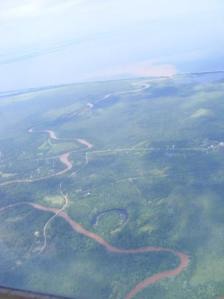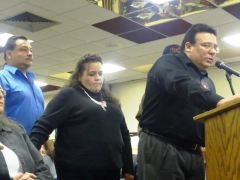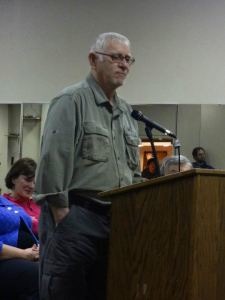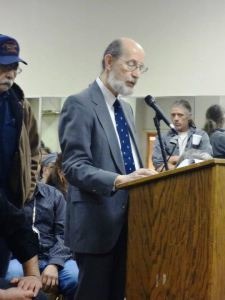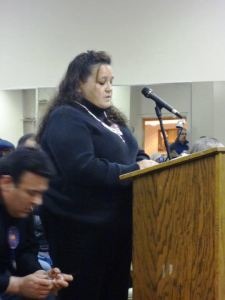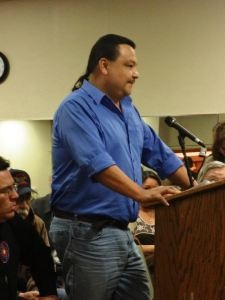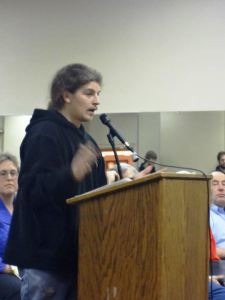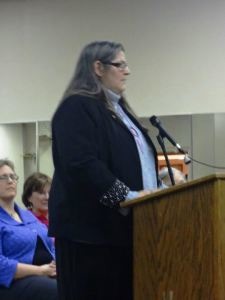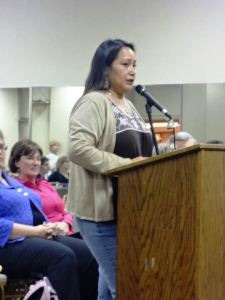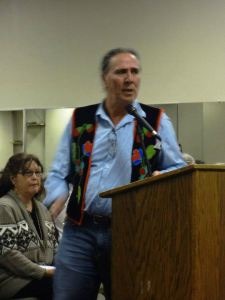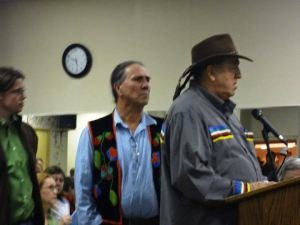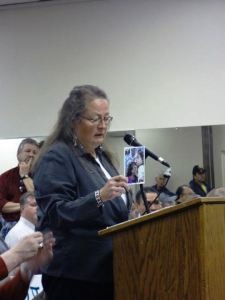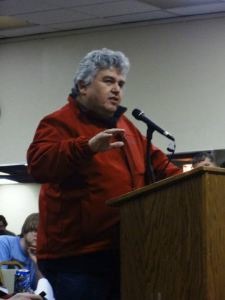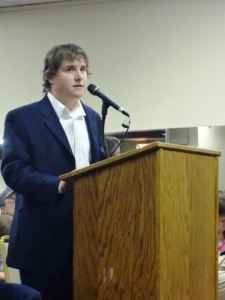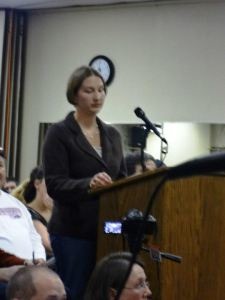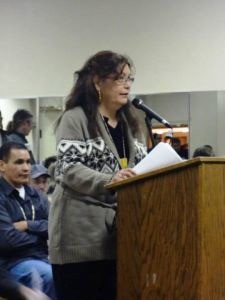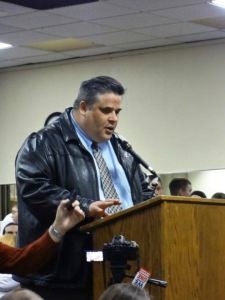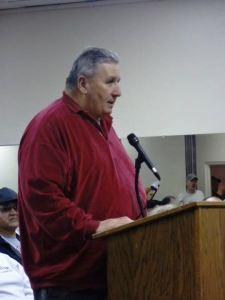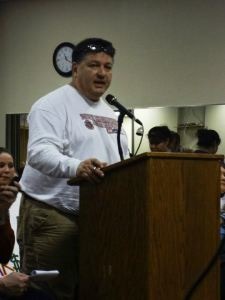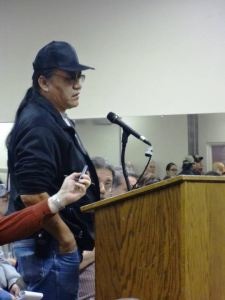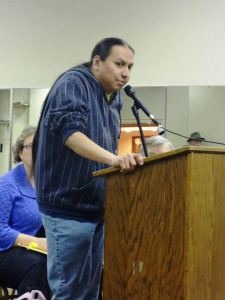Read this article on line Back
The Anishinaabe Speak: There Will Be No Mines In The Penokees
January 17, 2012 by Rebecca Kemble and Barbara With
[Editors note: The petition linked below has been closed since it is a year old. A similar photo essay about a hearing that took place on January 23, 2013 on a similar mining bill can be found by clicking here.]
Bad River. Photo © Larry Kinnett
Below is the testimony from members of the Anishinaabe Nation given at the Jobs, Economy and Small Business Committee hearing in Hurley on January 11, 2012. Lac Courte Oreilles, Lac du Flambeau, Menominee and Red Cliff tribes all traveled through inclement weather to stand in support of their family in Bad River.
Waiting over seven hours before being allowed to testify, no one on the committee wanted to admit the truth: they had ignored International Treaty Rights—that the State of Wisconsin is legally obligated to bring the tribes to the table when regulating the air and water quality on ceded lands that will affect their resources. Bad River testified that they were, indeed, left out of that process.
Not only would a mine in the Penokees destroy the watershed, affecting fish and wildlife, it would bring to an end the manomin, or wild rice that Bad River Tribe relies on to survive. But more than just survival, the death of the water would be the death of their religion.
According to the Bad River Band of the Lake Superior Tribe of Chippewa Indians Water Quality Standards Resolution, dated July 6, 2011, water is the sacred core element of their existence. Without clean water, their entire culture and society will cease to exist:
The history of the Bad River Band, as well as our future survival and growth, is inextricably intertwined with pure water. Anishinabe considers Nibi, Water, as the most sacred living part of our Mother, the Earth. Without water, there is no life. Water, is the life-blood of our Mother the Earth, and without healthy blood, illness prevails. Water is a finite resource, with its health being contingent on all sides of the environment that surrounds the water: above, below, and all around. Water is a primary component in the migration story of the Anishinabe people, and the migration story describes a search for a place where food grows on the water; that food is wild rice. The waters flowing throughout the entire Bad River Reservation provide a variety of sacred resources, such as Manomin (wild rice), Name (lake sturgeon), Ogaa (walleye), and other fish and game species, and serve as critical navigation routes that we rely upon for cultural, subsistence, health and economic well- being.
Although water quality standards are set within certain borders; water knows no boundaries. It is a living, moving part of life that changes with its surrounding environment, and as it changes it carries the burdens and illnesses of past environments until it heals. Because the Tribe’s cultural and spiritual identity, as well as the Tribe’s health and welfare depend upon maintaining and advancing the pristine quality of Tribal waters, the promulgation and enforcement of these Tribal water quality standards are essential to us. The Tribe is promulgating these standards to protect our political integrity, economic security, and health and welfare.
There will be no mines in the Penokees. End of story.
Mike Wiggins, Jr.
Mike Wiggins Jr.
“There’s a commonality that exists and that is you’re all representatives for citizens of this state. It’s a huge concern that the division amongst you is there. We tribes consult with each other and we won’t go in unless we have consensus. That’s the way we do things. We recognize some of the things in here as being unbelievable threats to us. What you heard from our attorney is that we’re willing to go to the mat on this stuff.
“I heard someone say this isn’t the time to ask questions. What does taking GTAC off the hook for groundwater contamination deeper than 1,000 feet have to do with streamlined processes? Nothing, but we could consult about that. After all this goes away, the open pit mine sits there and so do we.”
Joe Rose, Bad River
Joe Rose
“This is not a local issue—it has national and international implications. China purchased their first aircraft carrier from Russia. Their plans are to build a super navy. If the Chinese navy invades Taiwan we will be involved in another war … Why can’t this proposed mine be a part of our strategic mineral reserve. National security is more important than the profits for this company.”
Dennis Grzezinski, Attorney for Bad River
Dennis Grzezinski
“You should be ashamed and embarrassed to vote for this bill, we urge you to start over… You need to set up a permitting process and procedure that recognizes the duty and legal obligation of the state to consult with the tribes—all of them—whenever a project potentially affects the resources that they have a right to use subject to treaties. When you look at a bill and the series of entities who receive notice. Who’s missing? The tribes! How can you do that?”
Cherie Pero, Bad River
Cherie Per
“We are a sovereign nation who have been here for over 500 years. This will affect our children and all the children near the mine site. Possibility of heavy metal contamination, 5,000 acres of wild rice beds in Kakogan sloughs.”
Frank Connors, Jr. Bad River
Frank Connors
“When negotiating treaties, our ancestors saw the threat that hunger for natural resources posed. Treaties were written to protect this. Ten Chippewa bands worked with the states. We are doing our best to be good neighbors. Lack of government to government consultation is unacceptable. The severity of the effects of this appears to be clearly not recognized by this committee holding this hearing at this time and in this place. We would be honored to host any further hearings at no cost to the state of Wisconsin.”
Devin “Bear Cub” Sulier, Bad River
Devin “Bear Cub” SulierDevin “Bear Cub” Sulier, Bad River
“When I hear that there’s this bill on the table and they want to push it through, it’s gonna hurt everything that depends on the water. We are one circle: it is the circle of life. I’m sure you guys agree to that for a certain extent. Having a taconite mine there is illegal due to treaty rights. The Anishinabe, we are the first people, but we need to protect our places. All of our chiefs from all of our clans fought for these rights. Indians won’t support a mine that will kill us as a people.”
Denise McKutcheon Cloud, Bad River
Denise McKutcheon Cloud
“My oldest boy serves in Afghanistan. When he comes home to Bad River, he’s not a tribal member, he’s my son that was given to me. You destroy our wild rice, fishing, hunting, your’re not just taking it away from me, you’re taking it away from a whole country. My aunties come from Turtle Mountains in Bellcourte, North Dakota. They travel from there for the rice every year. My cousins from California travel for our rice and hunting that we do. My son comes home from overseas and he brags about what he receives from here. He brings home other soldiers that he has healed and they were amazed at our home. They felt safe, because we had what nobody else has. We have something very precious. My husband is a 4th generation logger. He’s disgraced that any white man would want to take god’s country away from us.”
Edith Leoso, Bad River
Edith Leosos
“I wonder why I was not heard the first time [at the West Allis hearing in December] …”
Marvin DeFoe, Vice-Chair, Red Cliff Band of the Lake Superior Chippewa
Marvin Defoe
“The bottom line is that we’re at the forefront of the questions of how we’re gonna create jobs. We have the opportunity, I’m catching glimpse that maybe, maybe we can paddle together in the canoe. That is what we need to do. I would like to see legislation in ecotourism! I would like to see this committee develop some green jobs! I’d like to see this committee create legislation that actually creates good jobs. We’re willing to sit down collectively in that canoe in that boat to work together, because that’s what its gonna take all over the world.”
Tony DePerry, Red Cliff
Tony DePerry
“I’m a very patient person. Been an elder for 38 some years. I’m a herbologist, and I do legend telling. I know quite a bit about the earth, the surface and the air and I try to share my knowledge with people as much as I can … You have the audacity to knock us around? We know how to survive. Now you tell us that we’re nothing? Excuse me, modern society you gotta wake up! This is 2012, not 1760, 1824, 1832, 1854.
“So how can you guys sit there and talk about these kind of things? You don’t know the impact, the devastation, the destruction that will happen in northern Wisconsin. Do you understand the continental divide? Wetlands? Unless you can guarantee me 1,000% that you won’t damage anything I won’t support you in the mine.”
Patti Aikin-Buffalo, Red Cliff
Patti Aikin-Buffalo
“As Anishinaabe, we harvest that rice and feed our kids with that rice. That is our food and our ceremonial substances. I’m insulted to think that the bill takes my land, pressures me by finances and expect this to demise my way of life. How dare you steal the shirt off my back, then ask me to pay for it. I don’t want my freedoms to be taken away. I want to be heard … If we want to dig up my grandmother, let’s dig up yours first.”
George Newago, Red Cliff
George Newago
“Everything we depend on requires water, and it knows no boundaries. If there’s even the smallest amount of risk to water, that’s too great. When you start to evaluate, many people don’t have the resources that we have. There’s places in the lower 48 that are dried up like prunes. They are coming for it. Don’t pee in my cheerios!”
Jacob Maas, Environmental Health Specialist, Red Cliff
Jacob Maas
“Extremely high incidence of Mesothelioma and lung cancer in taconite workers with secondary exposures to people living with the worker through the asbestos dust on their clothing … These are real people, not just statistics.”
Sarah Robleski, Natural Resource specialist for Red Cliff
Sarah Robleski
“Wild rice is extremely sensitive to even slight changes to these conditions. Just because iron mining is a physical and not a chemical process it doesn’t mean that it won’t have an environmental impact.”
Rebecca Allegria, Secretary, Menominee Tribal Legislature
Rebecca Allegria
“We traveled here on behalf of Menominee nation to oppose this bill in its entirety. We stand united with our fellow tribes.”
James Schlender, Lac Courte Oreilles
James Schlender
“We have to responsibly co-exist together. This legislation disrupts that balance and cooperation necessary for preserving the rights that we have … When the government starts tinkering with legislation like this, the impact is not on the government but on the people of the community.”
Tom Maulson, Lac du Flambeau
Tom Maulson
“You haven’t consulted us. Some of you are old enough to understand the fish wars … We will decide this issue. We the Anishinaabe have the right in the treaties. It’s not a threat, it’s a promise. We pay $40 million a year to Wisconsin, far more than mining people will pay. We share the resource, but we have the right to identify what the resources are going to be. When you back us in a corner, when you say, ‘We don’t wanna listen to you Indians,’ then I become an activist, a hell raiser. Are we going that route?”
Jerome Bigjohn, Lac du Flambeau
Jerome Bigjohn
“I welcome you here to Indian country. You are in the heart of Chippewa country, you are in the heart of ceded territory. We all have grave concerns over this mining bill. All six tribes went on record to oppose this bill. We have a pendulum here. Consider and think about your children and grandchildren … We’re not coming here to fight with our fists, we came to fight with our words, peacefully. We will stand strong and do what we have to to prevent this mine from happening amidst our homelands.”
Wendell St. Germain, Lac du Flambeau
Wendell St. Germain
“I’m with my people on this, 100% against it.”
Adrian King, Lac du Flambeau
Adrian King
“Sometimes when we do things we offer tobacco to our creator because we’re going take something that we need or that we’re going to use. There’s not enough tobacco in the world to offer for this mine. It’s not yours, it’s not mine, it’s ours.”
Please sign our petition, “Say No to Mining The Penokees”
photos and transcription: Rebecca Kemble

